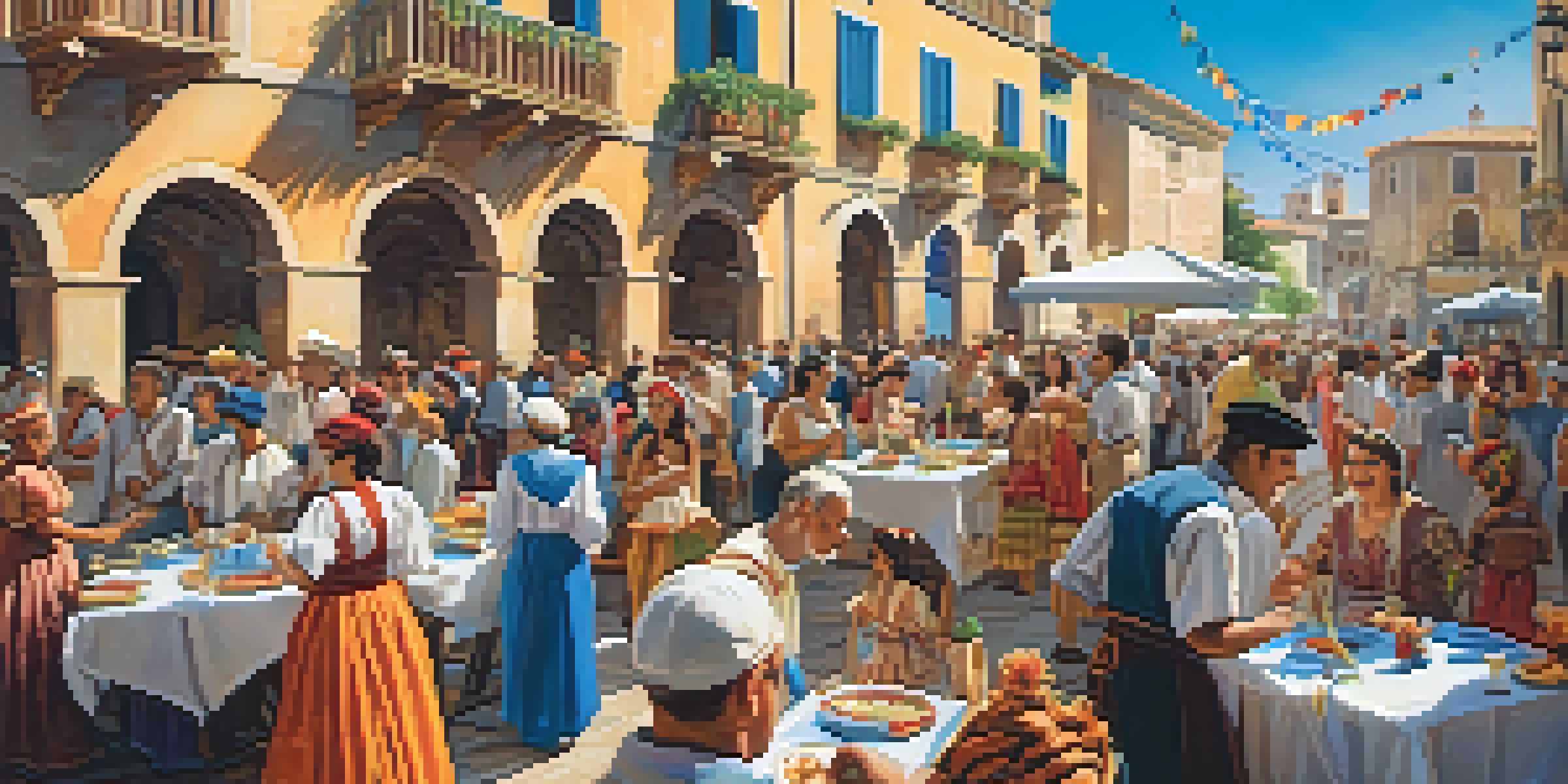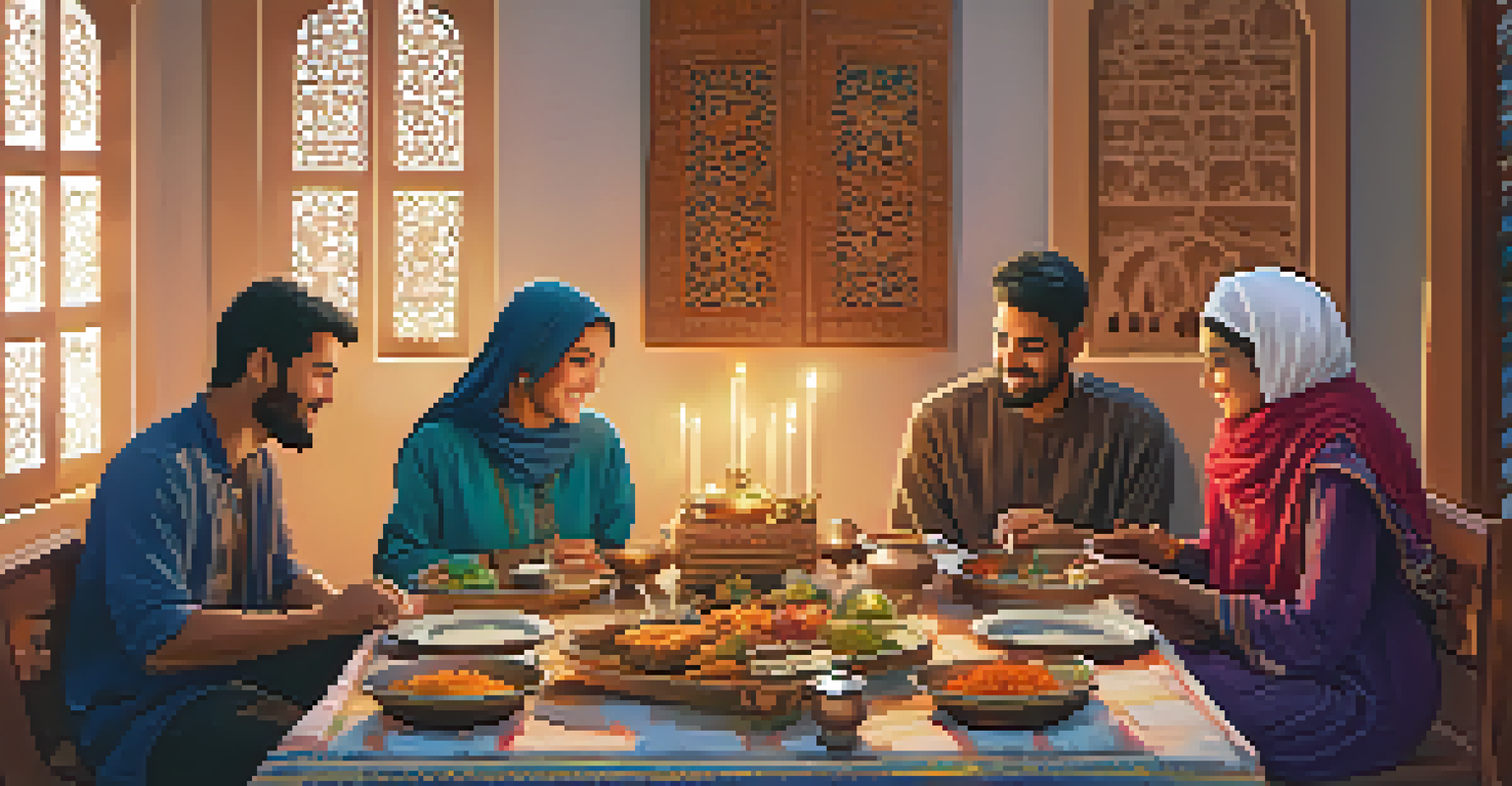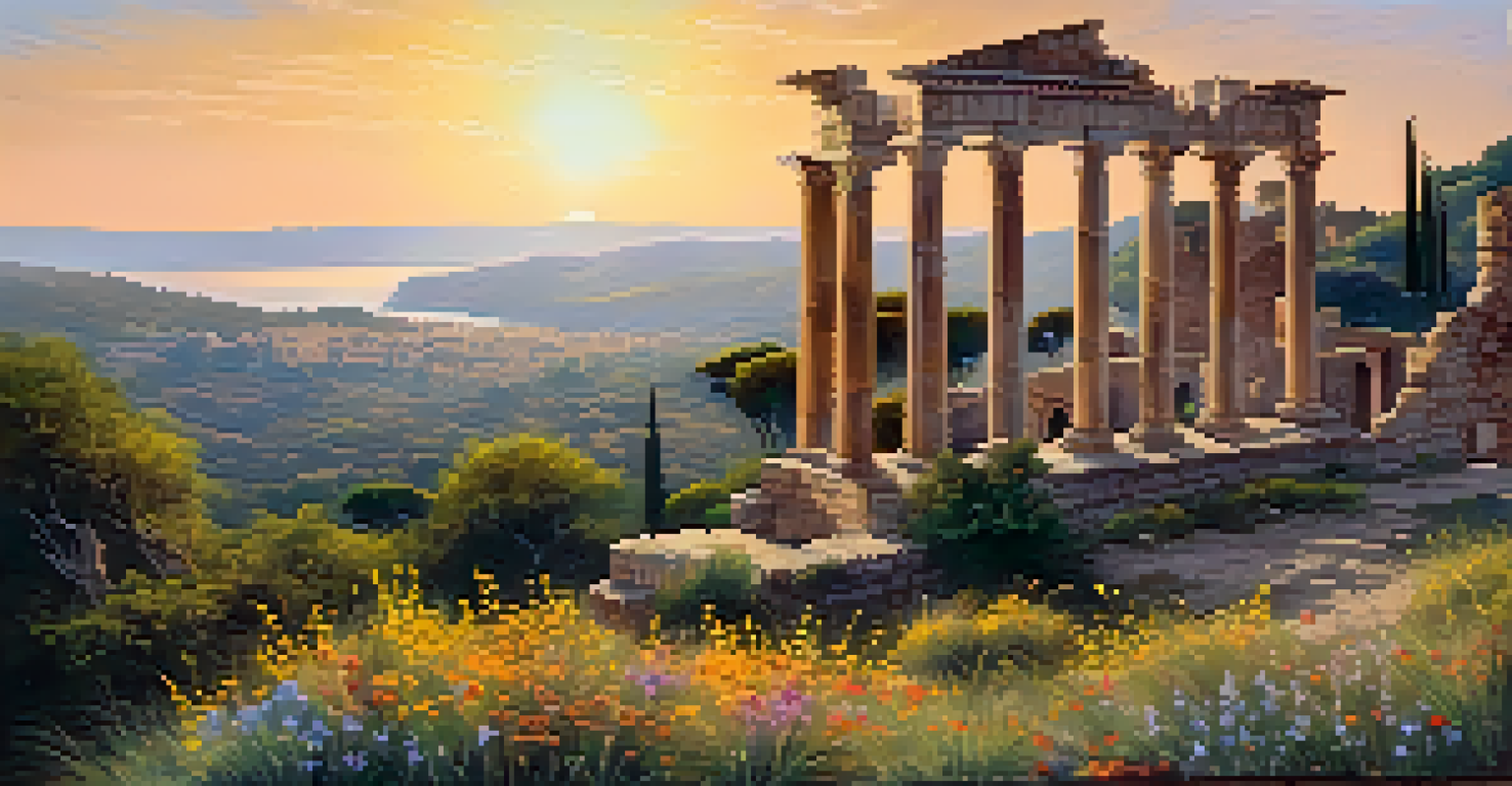Spirituality in the Mediterranean: A Cultural Overview

The Mediterranean: A Spiritual Melting Pot
The Mediterranean region is a vibrant tapestry of cultures, each with its unique spiritual practices. From the ancient Greeks to the modern-day practitioners, spirituality here is deeply intertwined with daily life. This blend of traditions creates a rich environment where diverse beliefs coexist, influencing everything from art to festivals.
The Mediterranean is a place where different cultures converge, and spirituality becomes a common thread that weaves through the tapestry of life.
For instance, the ancient Greeks revered a pantheon of gods, believing their deities influenced every aspect of life. Today, you can still see echoes of those beliefs in local customs and celebrations. This historical layering of spiritual practices offers a fascinating glimpse into how cultures evolve while retaining their essence.
Furthermore, as people travel across this sea, they bring their beliefs with them, creating a dynamic exchange of ideas. This fluidity not only fosters understanding but also shapes a unique Mediterranean identity that respects both tradition and innovation.
Christianity's Deep Roots in the Region
Christianity has significantly shaped the spiritual landscape of the Mediterranean, especially in places like Italy and Greece. The birth of the early Church and its subsequent spread transformed local cultures, intertwining faith with community life. Today, many Mediterranean countries celebrate their Christian heritage through vibrant festivals and religious events.

For example, the Feast of the Assumption in Italy draws thousands who gather to honor their faith with processions and communal meals. These events are not just religious; they also strengthen community bonds and preserve cultural traditions passed down through generations. This blend of spirituality and community spirit creates a sense of belonging.
Spiritual Diversity in the Mediterranean
The Mediterranean is a rich tapestry of diverse spiritual practices, blending ancient traditions with modern beliefs.
Moreover, the architecture of cathedrals and churches throughout the Mediterranean tells the story of faith's evolution over centuries. From the grandeur of St. Peter's Basilica in Vatican City to the simplicity of rural chapels, these structures are more than places of worship; they are monuments to the enduring influence of Christianity in the region.
Islamic Influence: Spirituality and Tradition
Islam has also played a pivotal role in shaping the Mediterranean's spiritual fabric, particularly in countries like Turkey, Morocco, and Tunisia. The introduction of Islamic traditions brought with it a rich array of rituals and cultural practices that continue to thrive today. Mosques, with their intricate designs and serene atmospheres, serve as focal points for community life.
Spirituality is not a destination, but a journey, where every belief and practice is a step towards understanding ourselves and the world around us.
Take, for example, the celebration of Ramadan, which fosters a deep sense of community and spirituality. During this month, families come together to break fast, share meals, and engage in prayers, reinforcing bonds and cultural identity. This practice illustrates how spirituality can cultivate unity and compassion among people.
Additionally, the influence of Sufism, a mystical branch of Islam, adds a unique layer to Mediterranean spirituality. Sufi practices, emphasizing love and a personal connection with the divine, can often be seen in poetry, music, and dance, enriching the cultural landscape of the region.
Mediterranean Paganism: Ancient Roots Revived
Paganism, though often overshadowed by the major world religions, has seen a resurgence in interest across the Mediterranean. Many individuals are reconnecting with ancient practices and beliefs that honor nature and the cycles of life. These modern pagan movements celebrate seasonal festivals, rituals, and a deep reverence for the earth.
For instance, the celebration of the Summer Solstice draws practitioners who honor the sun's power and the changing seasons. These gatherings foster a sense of community and shared values, echoing ancient customs while embracing contemporary ideals. This revival highlights the enduring nature of human spirituality, regardless of its form.
Christianity's Lasting Impact
Christianity has profoundly shaped Mediterranean culture, intertwining community life with vibrant religious festivals.
Moreover, this return to pagan roots often incorporates elements from various traditions, emphasizing inclusivity and respect for different beliefs. It's a reminder that spirituality can be both personal and communal, allowing individuals to forge connections with their heritage and the environment.
Philosophy and Spirituality: The Ancient Thinkers' Legacy
The Mediterranean is also the birthplace of many philosophical schools that intertwine closely with spirituality. Thinkers like Socrates, Plato, and Aristotle explored profound questions about existence, ethics, and the nature of the divine. Their teachings laid the groundwork for understanding spirituality in a more philosophical context, blending reason with faith.
For example, Plato's idea of the 'Form of the Good' suggests a higher reality that informs our understanding of morality and virtue. This philosophical approach encourages individuals to seek a deeper truth, bridging the gap between spiritual experiences and intellectual inquiry. It shows that spirituality isn't just about faith; it's also about seeking knowledge and understanding.
Today, many people in the Mediterranean continue to draw inspiration from these ancient philosophies. They integrate philosophical inquiry into their spiritual practices, creating a holistic approach to understanding life and existence.
Festivals: Celebrating Spiritual Diversity
Festivals are a vibrant expression of the Mediterranean's spiritual diversity, showcasing the rich tapestry of beliefs and practices. Whether it's the Carnival in Venice, the Ramadan celebrations in Morocco, or the Feast of St. John in Portugal, each event reflects the unique cultural fabric of its community. These festivals serve as a reminder of the joy and unity that spirituality can bring.
During these celebrations, people come together to honor their beliefs, share in communal meals, and participate in rituals that strengthen their cultural identity. For example, the Carnival in Venice blends religious roots with artistic expression, creating a spectacle that attracts visitors from around the world. This fusion of tradition and modernity highlights how spirituality can evolve while maintaining its core essence.
Paganism's Modern Revival
Modern pagan movements in the Mediterranean are reconnecting individuals with ancient practices that honor nature and community.
Moreover, festivals often promote intercultural dialogue, allowing people from different backgrounds to share their traditions and beliefs. This exchange fosters understanding and respect, reminding us of our shared humanity and the diverse ways we seek meaning in our lives.
The Future of Mediterranean Spirituality
As we look to the future, Mediterranean spirituality continues to evolve, influenced by globalization and modern societal changes. People are increasingly seeking spiritual fulfillment beyond traditional religious structures, exploring new practices and beliefs. This shift reflects a broader trend of individuals searching for meaning in a rapidly changing world.
For instance, mindfulness and wellness practices, often rooted in ancient traditions, are becoming popular across the region. Individuals are blending these practices with local customs, creating a unique spiritual landscape that honors both heritage and contemporary needs. This adaptability showcases the resilience and relevance of spirituality in today's society.

Ultimately, the future of Mediterranean spirituality may be characterized by a blend of old and new, where individuals draw from various traditions to create their unique spiritual paths. This journey reflects the region's rich history and its ongoing evolution, inviting everyone to explore the depths of their spirituality.